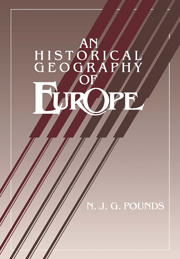Part III - Modern Europe
Published online by Cambridge University Press: 14 January 2010
Summary
Modern history, we are taught, began with the Renaissance. This was indeed a time of intellectual rebirth, a return to the speculative freedom of the Greeks. Mental horizons were broadened. The earliest steps in the development of modern science and medicine took place at this time, and the great voyages of the Portuguese, Spanish, French, and British extended the geographical horizon and made some Europeans aware of the peoples and resources of other parts of the world. But on essentially spatial aspects of European economy and society this new awakening had very little impact. In the material things of life the great break came, not with the intellectual reawakening of the late fifteenth and sixteenth centuries but some two centuries later, when an accelerating technical progress turned a preindustrial into an industrial society.
Nevertheless, the Renaissance was not without its impact on the spatial structure of the continent. There developed a new outlook on the environment. More and more people showed an interest in the land in which they lived. Books began to be written which combined geography with a somewhat biased account of the country's history. This new interest in the land was part of a broader concern, that with the nation. This was the time when people began to see themselves as part of a wider society than the community or kinship group. There had been “nations” during the Middle Ages, but they were groups independent of the soil, such as those met with at the “international” universities.
- Type
- Chapter
- Information
- An Historical Geography of Europe , pp. 211 - 213Publisher: Cambridge University PressPrint publication year: 1990



